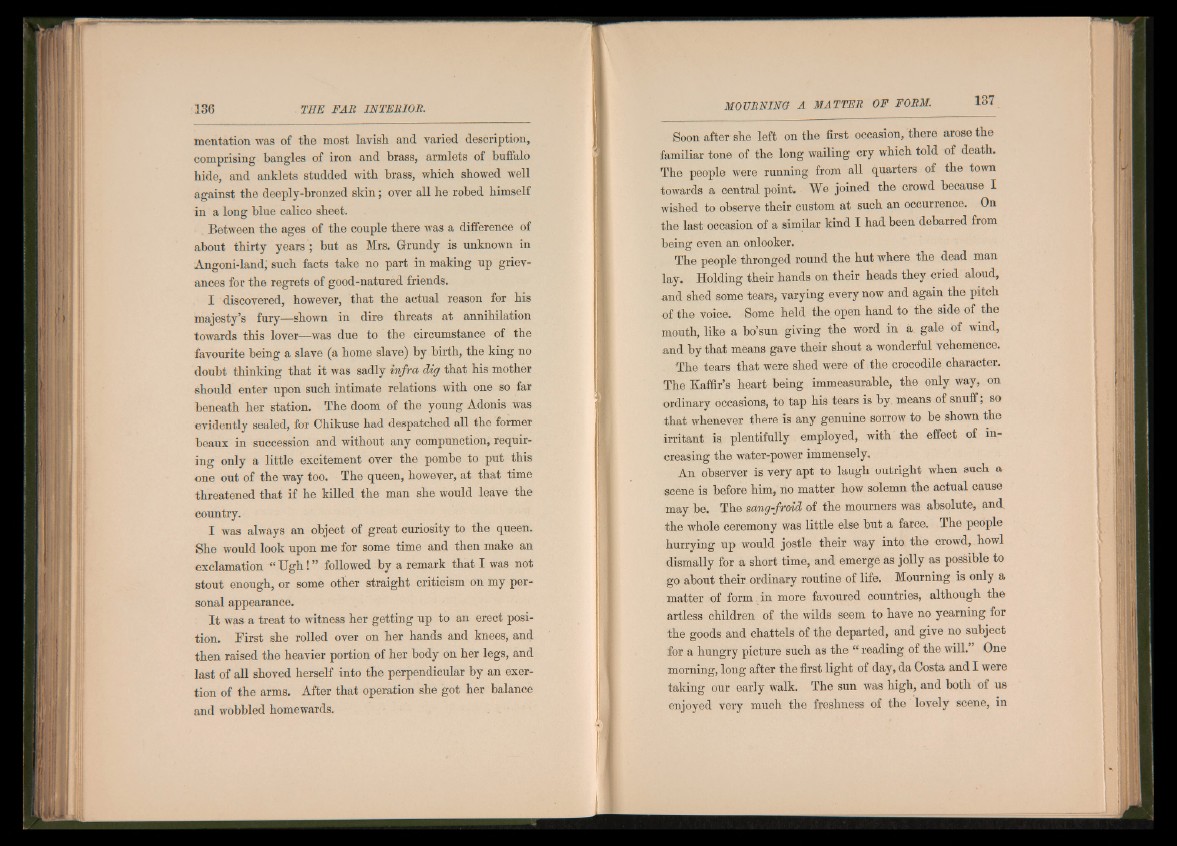
mentation was of the most lavish and varied description,
comprising bangles of iron and brass, armlets of buffalo
hide, and anklets studded with brass, which showed well
against the deeply-bronzed skin; over all he robed himself
in a long blue calico sheet.
Between the ages of the couple there was a difference of
about thirty years ; but as Mrs. Grundy is unknown in
Angoni-land, such facts take no part in making up grievances
for the regrets of good-natured friends.
I discovered, however, that the actual reason for his
majesty’s fury—shown in dire threats at annihilation
towards this lover—was due to the circumstance of the
favourite being a slave (a home slave) by birth, the king no
doubt thinking that it was sadly infra dig that his mother
should enter upon such intimate relations with one so far
beneath her station. The doom of the young Adonis was
evidently sealed, for Ohikuse had despatched all the former
beaux in succession and without any compunction, requiring
only a little excitement over the pombe to put this
one out of the way too. The queen, however, at that time
threatened that if he killed the man she would leave the
country.
I was always an object of great curiosity to the queen.
She would look upon me for some time and then make an
exclamation “ TTgh!” followed by a remark that I was not
stout enough, or some other straight criticism on my personal
appearance.
I t was a treat to witness her getting up to an erect position.
First she rolled over on her hands and knees, and
then raised the heavier portion of her body on her legs, and
last of all shoved herself into the perpendicular by an exertion
of the arms. After that operation she got her balance
and wobbled homewards.
Soon after she left on the first occasion, there arose the
familiar tone of the long wailing cry which told of death.
The people were running from all quarters of the town
towards a central point. We joined the crowd because I
wished to observe their custom at such an occurrence. On
the last occasion of a similar kind I had been debarred from
being even an onlooker.
The people thronged round the hut where the dead man
lay. Holding their hands on their heads they cried aloud,
.and shed some tears, varying every now and again the pitch
of the voice. Some held the open hand to the side of the
mouth, like a bo’sun giving the word in a. gale of wind,
and by that means gave their shout a wonderful vehemence.
The tears that were shed were of the crocodile character.
The Kaffir’s heart being immeasurable, the only way, on
ordinary occasions, to tap his tears is by. means of snuff; so
that whenever there is any genuine sorrow to be shown the
irritant is plentifully employed, with the effect of increasing
the water-power immensely.
An observer is very apt to laugh outright when such a
scene is before him, no matter how solemn the actual cause
may be. The sang-froid of the mourners was absolute, and,
the whole ceremony was little else but a farce. The people
hurrying up would jostle their way into the crowd, howl
dismally for a short time, and emerge as jolly as possible to
go about their ordinary routine of life. Mourning is only a
matter of form in more favoured countries, although the
artless children of the wilds seem to have no yearning for
the goods and chattels of the departed, and give no subject
for a hungry picture such as the “ reading of the will. One
morning, long after the first light of day, da Costa and I were
taking our early walk. The sun was high, and both of us
enjoyed very much the freshness of the lovely scene, in